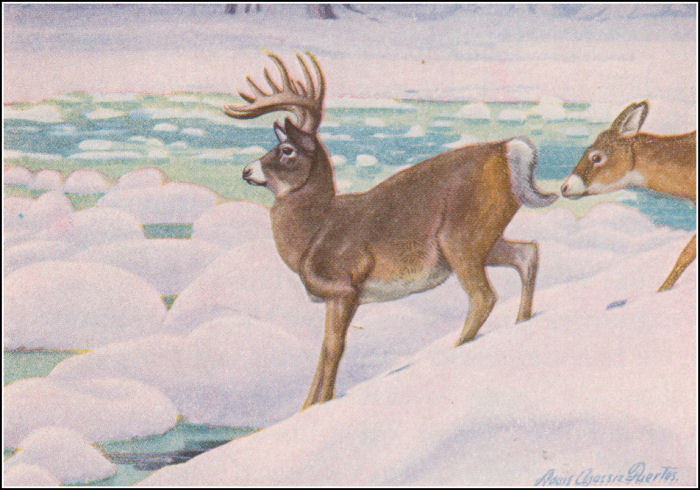READING-LITERATURE: Third Reader by Harriette Taylor Treadwell
The Bear and the Fox
It was in the spring. The trees were clothed in green and the earth was covered
with flowers. It was then that the lion, the king of beasts, called his court
together.
Soon all the beasts, both great and small, came in great numbers. Only
Reynard the fox was absent. He knew that he was guilty of many misdeeds against
the other beasts. He knew that if he came to court he put his life in danger.
The king heard the complaints of the wolf, the hound, and the cock against
the fox. He decided that Reynard should appear before the court to answer the
complaints. Then he said to Bruin the bear, "You shall take this message to
Reynard. But remember, Bruin, that Reynard knows how to flatter even the
wisest."
"Let me alone with Reynard," said Bruin; "if he mocks me I shall pay him
back."
So the next morning Bruin set out. When he came to Reynard's castle the gate
was shut. He knocked and knocked.
Then he shouted, "Sir Reynard, are you at
home? I am Bruin, your kinsman, with a message from the king. You are summoned
to appear at court to answer for your misdeeds. The king has taken a vow that if
you fail to appear it shall cost you your life. So take the advice of a friend
and come with me."
Reynard was lying near the gate basking in the sun. He lay quiet and listened
to the bear. He made sure that Bruin was alone. Then he went into one of his
holes. There he thought out what to do to disgrace Bruin and escape going to
court.
At last he came forth and said, "Dear Uncle Bruin, how tired you must be.
Come in and rest. The king should not have sent you on this long journey; you
who are next to him in royal blood and riches. I am going to court to-morrow. I
was not well enough to go to-day. I have been eating such strange new meat and
it has made me ill."
"What is this strange meat?" asked Bruin.
"Uncle," replied the fox, "why do you care to know? It was only honeycomb. It
was simple and mean. I was hungry and I ate too much."
"Do you call honeycomb simple and mean?" cried Bruin. "Come, my dear Reynard,
and help me to some of this honey, and I will be your friend as long as I live."
"You are jesting with me," said Reynard.
"I am in earnest," cried Bruin. "For one lick of that honeycomb I will be
your friend forever and I will stop the mouths of your enemies."
"If that is true, I can serve you," said the fox. "At the foot of this
mountain lives a farmer, who has more honey than you could eat in seven years. I
will take you to it."
The bear gave him many thanks and away they went. At last they came to an oak
tree in which the farmer had driven a wedge.
"Dear Uncle," said Reynard, "in this tree there is more honey than you can
eat. Put your nose inside this gap and you will find it. Do not eat too much. It
might do you harm."
"Do not fear for me," said the bear.
Then he put his front paws into the gap and thrust his head in up to his
ears.
When the fox saw this he ran and pulled the wedge out and left Bruin locked
in the tree. The bear began to howl and to scratch with his hind feet. He made
such a noise that the farmer heard it and ran out to see what was the matter.
And the fox from afar off cried, "Is
the honey good, Uncle? Do not eat too
much."
When the farmer saw the bear he called to his neighbors to come and see. Men,
women, and children came running out, some with one weapon and some with
another.
Poor Bruin, hearing all this noise, pulled and pulled till he had pulled
himself free; but he left his ears behind and the skin of his forepaws. Then he
made a leap to get away and fell into the river.
Meanwhile the fox was feeling gay. "All is well," he said, "my enemy is dead
and I shall not have to go to court." So he stole a fat hen and started home.
When he came to the river he saw the bear resting on the bank. He was filled
with fear, but he said, "Well, Uncle, did you eat all the honey? It has made you
sick. Where are your ears and your gloves?"
Filled with rage, the bear crept to the water. He plunged in and swam down
the stream. When he came to a flat bank he
landed and lay there, sick and sore.
Then he said to himself, "How can I get back to court? I cannot walk, yet to the
court I must go, for Reynard shall pay for this."
So he set his tail on the ground and tumbled his body over and over. After
many days he tumbled into court.
"Who can this strange creature be?" they all cried.
But when the king saw him he said, "It is Bruin; who could have wounded him
like this?"
"O king," said Bruin, "it was that false Reynard who has brought me to
disgrace."
"How dare he do this?" said the king. "I swear now that I shall make him
tremble." Whereupon the king sent for his council.
It was decided that Reynard should again be summoned to court. He must be
made to answer for all his wrong doing. So Tibert the cat was chosen to get
Reynard, for the cat was known for his great wisdom.
| 